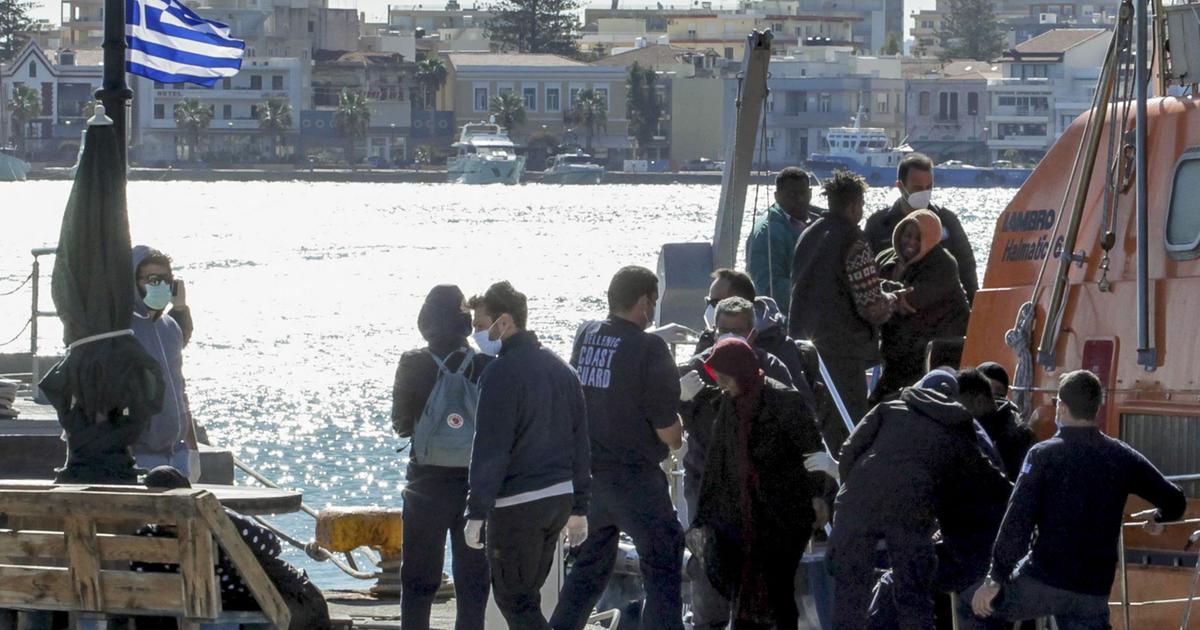Enlarge image
A US soldier holds a baby in his arms at Kabul Airport.
At the moment it is almost impossible for refugees to get out of Afghanistan
Photo: US Marines / imago images / ZUMA Wire
Chancellor Angela Merkel speaks of a “tragedy”.
Federal President Frank-Walter Steinmeier called the pictures from Kabul "shameful for the political West".
There is great concern across all political camps about the takeover of power by the fundamentalist-religious Taliban in Afghanistan.
However, it is apparently not big enough for the EU states to call themselves up to really help Afghan refugees.
Canada and ex-EU member Great Britain led the way last week by guaranteeing contingents for several thousand refugees from Afghanistan each.
The Europeans are reacting to the Afghan catastrophe as they have almost always done in the past few years in the field of asylum policy: they weigh it down.
Since the so-called refugee crisis in 2015, when more than a million refugees from the Middle East came to the EU, a consensus has developed on the continent that refugees should be kept out of Europe - if necessary by force.
The reluctance among European heads of state and government to take responsibility for people in need is so great that it cannot be shaken, not by the plight of Afghan girls and women, not by pictures of people in desperation looking at planes cling.
Instead, Europe's politicians are repeating well-known proposals that have not worked in previous crises.
Federal Minister of the Interior Horst Seehofer, for example, would like the people to be cared for “on site”, in other words in the neighboring states of Afghanistan, Iran for example.
What he doesn't say is exactly how it should work.
Iran is itself in a serious economic crisis, the pandemic is spreading rapidly.
The country is unlikely to be able to take care of large numbers of Afghan refugees.
In addition, the EU has hardly any reliable relations with the Iranian terror regime.
Austria's Chancellor Sebastian Kurz goes even further.
Not only does he not want to take in people, he also wants to hold on to the deportation of Afghans;
if not to Afghanistan, then to the neighboring countries, says his interior minister Karl Nehammer.
And Greek Prime Minister Kyriakos Mitsotakis has announced that, if necessary, the right to asylum for newcomers will again be suspended, as he did in spring 2020 when Turkish President Recep Tayyip Erdoğan had migrants brought to the Turkish-Greek border.
Almost all of these proposals come with the warning that 2015 should not be repeated.
The situation today is very different from six years ago.
At that time, the gates from Syria to Germany were actually largely open.
Asylum seekers were able to get more or less unhindered from the Middle East to Europe via Turkey.
Today the routes are tight.
The Taliban control the border crossings, which is why only a few people are currently making it out of the country, for example to Iran.
Turkey has built a wall on the border with Iran to keep Afghans out.
Erdoğan has also sent 30,000 soldiers to the region.
The few asylum seekers who still make it to Turkey and want to continue to Europe are intercepted by the Greek Navy and illegally deported to Turkey.
As a result, people are stuck, either in Turkey, in Iran or - in the vast majority of cases - in Afghanistan.
So the question is not how a second 2015 can be prevented, but how the Afghans can be helped in the face of this situation.
Green Chancellor candidate Annalena Baerbock spoke out in favor of a quota solution at the weekend, as experts like David Kipp from the Berlin Foundation for Science have been doing for a long time.
According to the Greens, 50,000 Afghans could be resettled to Germany in this way.
It is the only way to rescue particularly threatened groups without shifting responsibility onto neighboring states.
It is not very easy to implement.
As the slow evacuation of the local staff shows, it is extremely difficult to get people out of Afghanistan at all at the moment.
This would require an airlift in countries like Uzbekistan, from where the people would then be further redistributed.
It would also be possible to take in those seeking protection who have already made it out of Afghanistan and are now staying in Iran or Pakistan, for example.
That would at least relieve the neighboring states of Afghanistan.
The EU states are at odds over migration policy for the foreseeable future and are therefore unable to act.
Germany should therefore join forces with other countries willing to accept them, with Canada, Great Britain and the USA.
A large-scale, international resettlement program is needed, as was the case with the Vietnam refugees.
It could be coordinated by the UN refugee agency UNHCR, which has years of experience in resettlement.
In Germany there is definitely a majority in favor of such a policy.
According to an online survey by the opinion research institute YouGov on behalf of the Seebrücke Initiative, almost two thirds of German citizens are in favor of protecting threatened people from Afghanistan in Germany.
Foreign Minister Heiko Maas just said in an interview with SPIEGEL that it was a “damned duty” to get as many people as possible out of Afghanistan.
It is time for him and everyone else in charge in the federal government to do their job.






/cloudfront-eu-central-1.images.arcpublishing.com/prisa/4PKPLHZOXBG5TEAQ6JNDTUJXBA.jpg)








